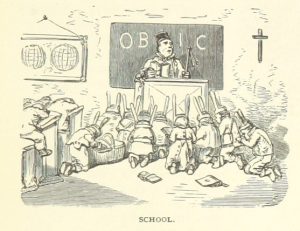In this blog post, Bethany Stokes and Olivia Hennessy, third-year History students at the University of Lincoln, share their perspectives on some research that they did as part of the Post-Pandemic Pedagogy project.
Recently, we analysed some data as part of the wider Post-Pandemic Pedagogy survey of History students and staff that was carried out last academic year. When conducting this research, there were two specific sets of data to analyse: firstly, the respondents’ thoughts on assessments/examinations and secondly, their reflection on feedback. The survey asked them to rate their experiences of exams and feedback before, during and after the pandemic. We analysed student and staff responses using a technique called sentiment analysis. This approach allows you to search through data and learn how respondents feel about various issues, especially whether their response was positive, negative, or neutral. We analysed the data and produced staff and student Excel worksheet, where conditional formatting was used to easily present our findings through a colour coded system.
What did we find out? What was the most interesting?
We identified several interesting themes and picked out some emblematic quotes in this research project. Firstly, most students and staff agreed that there are prolonged stress and unrealistic expectations for students who have done in-person exams. Both staff and students are aware of the mental health difficulties surrounding exams, repeatedly emphasises how history is not about memorising content, as the following academic respondent noted:
“Exams cause students needless anxiety, and in-person exams are difficult to read and poorly expressed. History isn’t about a quick quiz type of knowledge, and take-home exams allow students the ability to think things through, which is reflected in the higher grades that have resulted from this switch.”
Interestingly, while many of the staff responses revolved (to some extent) around the potential for students to cheat or plagiarise content when being assessed by anything other than traditional exams (e.g. coursework or take-home/ open-book exams), only one student highlighted the potential for academic malpractice (student response – “Limits the huge amount of cheating.”)

Furthermore, both staff and students prefer face-to-face feedback because it provides opportunities to discuss particular issues when communicating with lecturers in person. Students emphasised that face-to-face feedback should be “encouraged by staff,” a sentiment that was echoed those staff that addressed staff-student discussions.
Finally, some staff members are aware of the audio feedback feature on Turnitin, which was not mentioned by students (staff response – “tried using the audio feedback feature on Turnitin…. would like to keep exploring this going forward”). The audio feedback could be beneficial for both staff and students as some might struggle with reading on a screen, particularly a white background with black text.
How it relates to us?
Most of our time at university has been affected by the pandemic. In our first year, we experienced a limited amount of blended learning prior to the December lockdown and following this, the rest of our first year was online. We experienced a variety of assessments, primarily essays, research projects and take-home exams. Additionally, our second year was affected by lockdowns and other Covid-related disruptions. Prior to the pandemic, other students discussed how meetings with lectures were primarily face to face, whereas students are now given the option to either meet in person or online.
We found the responses about assessment and feedback interesting to analyse, particularly those relating to examinations, as the University of Lincoln predominantly assesses history students through coursework-based assessments.